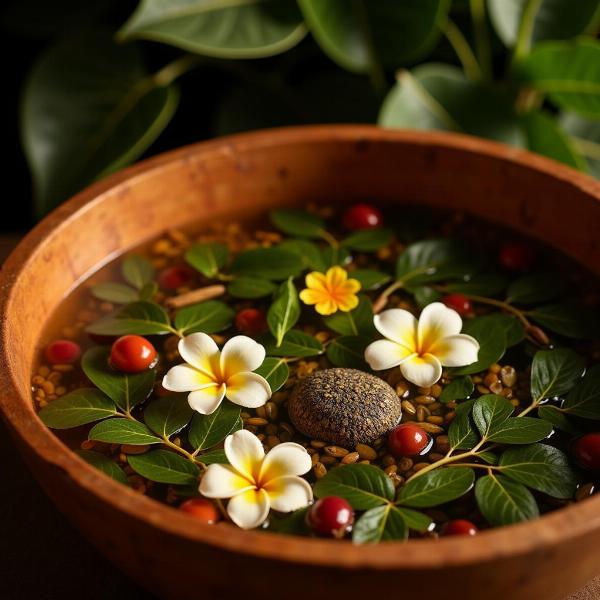Understanding the meaning of “take bath” in Hindi goes beyond simple translation. It delves into the rich cultural significance of bathing in India, encompassing rituals, traditions, and daily practices. “Take bath” can be translated as “स्नान करना” (snaan karna) in Hindi. However, this translation only scratches the surface. In this article, we’ll explore the various nuances and cultural contexts related to bathing in India.
Exploring the Nuances of “Take Bath” in Hindi
While “snaan karna” is a common translation for “take bath,” various other terms and phrases in Hindi more accurately reflect specific bathing practices. These terms often reflect the purpose, time, or method of bathing. For example, “nahana” (नहाना) refers to a regular bath, while “gusl karna” (गुस्ल करना) specifically denotes a ritual bath for purification after certain events. Understanding these subtle differences is crucial for accurately conveying the intended meaning.
Consider the cultural context when translating “take bath.” A simple bath in the morning might be “subah nahana” (सुबह नहाना). A ritual bath before a religious ceremony might be “pooja se pehle snaan” (पूजा से पहले स्नान). This specificity reflects the importance of bathing in Indian culture.
The Cultural Significance of Bathing in India
Bathing in India is more than just hygiene; it’s a deeply ingrained cultural and spiritual practice. Water is considered sacred, symbolizing purification and renewal. From daily cleansing to elaborate rituals, bathing plays a central role in Hindu tradition. Many rivers, like the Ganges, are considered holy, and bathing in them is believed to cleanse sins and bring blessings.
Ritualistic Bathing and its Significance
Various religious ceremonies and life events involve specific bathing rituals. For instance, before a wedding, the bride and groom undergo elaborate bathing ceremonies to purify themselves and prepare for the sacred union. Similarly, after childbirth, there are prescribed bathing rituals for the mother.
Different Types of Baths and Their Meanings
The specific type of bath and its associated meaning can vary depending on the region, community, and individual beliefs. Some baths involve specific herbs, oils, and prayers, further emphasizing the ritualistic and spiritual aspects of bathing.
Take Bath: From Everyday Routine to Spiritual Practice
From the daily “nahana” to the ritualistic “snaan,” taking a bath in India encompasses a wide spectrum of practices. Understanding the various terms, cultural contexts, and underlying beliefs associated with bathing provides a richer understanding of this seemingly simple act.
 Herbal bath for Ayurvedic Treatment
Herbal bath for Ayurvedic Treatment
Conclusion: More Than Just “Take Bath”
The meaning of “take bath” in Hindi transcends literal translation, reflecting the intricate connection between hygiene, spirituality, and culture in India. By understanding the nuances of “snaan karna,” “nahana,” and other related terms, we can appreciate the deeper significance of bathing in this vibrant culture. Learning these terms allows for more accurate communication and a deeper appreciation of Indian traditions.
FAQ: Common Questions about Bathing in India
-
What is the most common Hindi word for “take bath”? The most common word is “nahana” (नहाना) for a regular bath and “snaan karna” (स्नान करना) for a ritual bath.
-
Why is bathing so important in Indian culture? Bathing is considered a purifying ritual, cleansing both the body and the soul.
-
Are there specific rules for bathing in India? Rules and customs vary depending on the region, community, and the specific ritual involved.
-
What is the significance of bathing in the Ganges River? The Ganges is considered a holy river, and bathing in it is believed to wash away sins and bring blessings.
-
What are some common bathing rituals in Hinduism? Many rituals involve specific prayers, herbs, and offerings to deities.
-
Is there a difference between “nahana” and “snaan karna”? “Nahana” refers to a regular bath, while “snaan karna” is often used for ritualistic bathing.
-
How does the meaning of “take bath” change in different contexts? The specific terminology and cultural significance can vary based on the purpose and context of the bath.
Meaning-Hindi.in is your trusted partner for all your Hindi translation needs. We specialize in providing high-quality and culturally sensitive translations for various industries, including business, legal, technical, website localization, educational, and specialized fields. Our expertise ensures accurate and nuanced translations that reflect the rich tapestry of the Hindi language and Indian culture. For professional Hindi translation services, contact us at [email protected] or call us at +91 11-4502-7584. Meaning-Hindi.in is here to help you bridge the language gap and connect with the world.